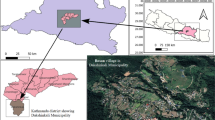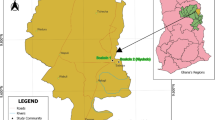Abstract
Dramatic climatic change in the Arctic elevates the importance of determining the risk of exposure for people living in vulnerable areas and developing effective adaptation programs. Climate change assessment reports are valuable, and often definitive, sources of information for decision makers when constructing adaptation plans, yet the scope of these reports is too coarse to identify site-specific exposure to the impacts of climate change and adaptation needs. Subsistence hunters and gatherers in the Arctic are valuable knowledge holders of climate-related change in their area. Incorporating both their traditional ecological knowledge and information found in climate science assessment reports can offer adaption planners a deeper understanding of exposure to climate change and local adaptation needs. In this study, we compare information found in assessment reports of climate change in the Arctic with what we have learned from the Alaskans Sharing Indigenous Knowledge project from 2009 to 2012, a research project documenting traditional ecological knowledge in two Native villages in Alaska, Savoonga and Shaktoolik. Content analysis of the interviews with hunters and gatherers reveal the site-specific impacts of climate change affecting these two villages. We find that their traditional ecological knowledge is complimentary and largely corroborates the climate science found in assessment reports. Traditional ecological knowledge, however, is more current to the social and local conditions of the villages, and presents a more unified social and biophysical portrayal of the impacts of climate change. If taken together, these two forms of knowledge can focus adaptation planning on the pertinent needs of the communities in question.


Similar content being viewed by others
References
ACIA (Arctic Climate Impact Assessment) (2004) Arctic climate impact assessment: impacts of a warming climate. Cambridge, New York
ACRGE (Alaska Commission on Rural Governance and Empowerment) (1999) Final report to the governor. www.dced.state.ak.us/dca/RGC/Cover.pdf Accessed 28 June 2013
AMAP (Arctic Monitoring and Assessment Programme) (2011) Snow, water, ice and permafrost in the Arctic (SWIPA): climate change and the cryosphere. Narayana, Gylling, Denmark
AMAP (Arctic Monitoring and Assessment Programme) (2012) Arctic climate issues 2011: changes in snow, water, ice and permafrost. SWIPA 2011. Overview Report. Oslo, Norway
Armitage D, Berkes F, Dale A, Kocho-Schellenberg E, Patton E (2011) Co-management and the co-production of knowledge: learning to adapt in Canada’s Arctic. Glob Environ Chang 21:995–1004
Bennholdt-Thomsen V, Mies M (1999) The subsistence perspective: beyond the globalised economy. Zed, London
Berkes F (2009) Indigenous ways of knowing and the study of environmental change. J R Soc N Z 39(4):151–156
Berkes F (2012) Sacred ecology, 3rd edn. Routledge Press, New York
Bohensky EL, Maru Y (2011) Indigenous knowledge, science, and resilience: what have we learned from a decade of international literature on “integration”? Ecol Soc 16(4):6
CAFF (Conservation of Arctic Flora and Fauna) (2010) Arctic biodiversity trends 2010: selected indicators of change. Working Group of the Arctic Council, Iceland
CPC (Canadian Polar Commission) (2012) International polar year Canadian science report: highlights. Canadian Polar Commission, Ottawa
DFO (Fisheries and Oceans Canada) (2010) Key findings from international polar year 2007–2008 at fisheries and oceans Canada. Communications Branch Fisheries and Oceans Canada, Ottawa
Fabricius C, Scholes R, Cundill G (2006) Mobilizing knowledge for integrated ecosystem assessments. In: Reid WV, Berkes F, Wilbanks TJ, Capistrano D (eds) Bridging scales and knowledge systems: concepts and applications in ecosystem assessment. Island Press, Washington, DC
Folke C (2004) Traditional knowledge in social-ecological systems. Ecol Soc 9(3):7
Ford JD, Furgal C (2009) Special issue: climate change impacts, adaptation and vulnerability in the Arctic. Polar Res 28(1):1–9
Ford JD, Smit B (2004) A framework for assessing the vulnerability of communities in the Canadian Arctic to risks associated with climate change. Arctic 57(4):389–400
Ford JD, Pearce T, Duerden F, Furgal C, Smit B (2010) Climate change policy responses for Canada’s Inuit population: the importance of and opportunities for adaptation. Glob Environ Chang 20:177–191
G8 (Group of Eight) (2005) Gleneagles plan of action: climate change, clean energy and sustainable development. Gleneagles, England http://www.g8.utoronto.ca/summit/2005gleneagles/climatechangeplan.html Accessed 6 August 2012
Gagnon CA, Berteaux D (2009) Integrating traditional ecological knowledge and ecological science: a question of scale. Ecol Soc 14(2):19
Glaser B (2008) Grounded theory institute http://www.groundedtheory.com/ Accessed 29 September 2011
Gratani M, Butler JRE, Royee F, Valentine P, Burrows D, Canendo WI, Anderson AS (2011) Is validation of indigenous ecological knowledge a disrespectful process? A case study of traditional fishing poisons and invasive fish management from wet tropics, Australia. Ecol Soc 16(3):25
Green D, Raygorodetsky G (2010) Indigenous knowledge of a changing climate. Clim Change 100(4):239–242
Guston DH (2001) Boundary organizations in environmental policy and science: an introduction. Sci Technol Hum Values 26(4):399–408
Houde N (2007) The six faces of traditional ecological knowledge: challenges and opportunities for Canadian co-management arrangements. Ecol Soc 12(2):34
Huntington H (2000) Using traditional ecological knowledge in science: methods and applications. Ecol Appl 10(5):1270–1274
Huntington H, Callaghan T, Fox S, Krupnik I (2004) Matching traditional and scientific observations to detect environmental change: a discussion on Arctic terrestrial ecosystems. Ambio 13:18–23
Huntington HP, Hamilton LC, Nicolson C, Brunner R, Lynch A, Ogilvie EJ, Voinov A (2007) Toward understanding the human dimensions of the rapidly changing Arctic system: insights and approaches from five HARC projects. Reg Environ Chang 7:173–186
IPCC (Intergovernmental Panel on Climate Change) (2007) Climate change 2007: impacts, adaptation and vulnerability. Parry ML, Canziani OF, Palutikof JP, van der Linden PJ, Hanson CE (eds) Cambridge, New York
IPCC (Intergovernmental Panel on Climate Change) (2012) Managing the risks of extreme events and disasters to advance climate change adaptation. Field CB et al. (eds) Cambridge, New York
Keller AC (2010) Credibility and relevance in environmental policy: measuring strategies and performance among science assessment organizations. J Public Adm Res Theory 20(2):357–386
Krupnik I, Jolly D (2002) The earth is faster now: indigenous observation on Arctic environmental change. Arcus, Fairbanks
Mastrandrea, MD, Field C.B, Stocker TF, Edenhofer O, Ebi KL, Frame DJ, Held H, Kriegler E, Mach KJ, Matschoss PR, Plattner GK, Yohe GH and Zwiers FW (2010) Guidance note for lead authors of the IPCC fifth assessment report on consistent treatment of uncertainties. Intergovernmental Panel on Climate Change
Moller H, Berkes F, Lyver PO, Kislalioglu M (2004) Combining science and traditional ecological knowledge: monitoring populations for co-management. Ecol Soc 9(3):2
Oozeva C, Noongwook C, Noongwook G, Alowa C, Krupnik I (2004) Watching ice and weather our way. Arctic Studies Center, Smithsonian Institution, Washington, DC
Pearce TD, Ford JD, Laidler GJ, Smit B, Duerden F, Allarut M, Andrachuk M, Baryluk S, Dialla A, Elee P, Goose A, Ikummaq T, Joamie E, Kataoyak F, Loring E, Meakin S, Nickels S, Shappa K, Shirley J, Wandel J. (2009) Community collaboration and climate change research in the Canadian Arctic. Polar Res 28:10–27
Rosales J, Montan J (2010) Citizen science as an organizing principle for the environmental work of the local government in the Adirondack region. Adiron J Environ Stud 16.1 http://www.ajes.org/v16/rosal2010.php Accessed 21 November 2012
Salick J, Ross N (2009) Traditional peoples and climate change. Glob Environ Chang 19:137–139
Siebenhuner B (2003) The changing role of nation states in international environmental assessments—the case of the IPCC. Glob Environ Chang 13(2):113–123
State of Alaska (2012) Alaska community database community information summaries. http://commerce.alaska.gov/dca/commdb/CF_CIS.htm. Accessed 14 May 2012
Teixeira JB, Martins AS, Pinheiro HT, Secchin A, de Moura RL, Bastos AC (2013) Traditional ecological knowledge and the mapping of benthic marine habitats. J Environ Manage 115:241–250
Tol RSJ (2011) Regulating knowledge monopolies: the case of the IPCC. Clim Change 108(4):827–839
UN (United Nations) (2008) United Nations declaration on the rights of indigenous peoples. United Nations, New York
USGCRP (United States Global Change Research Program) (2009) Global Climate Change Impacts in the United States. Karl T R, Melillo J M, Peterson T C (eds) Cambridge, New York
Usher PJ (2000) Traditional ecological knowledge in environmental assessment and management. Arctic 53(2):183–193
Acknowledgments
We thank the residents of Savoonga and Shaktoolik who welcomed us in to their villages and homes, and to the Tribal Councils for their consent to do this work. We are particularly grateful to Perry Pungowiyi and Carole Sookiayak for their outstanding work in coordinating this project in their villages. Thanks to Emma Kearney, Meredith Kenney, and Elizabeth Atwood for their help with interviews and to Matilda Larson for generating Fig. 1. We thank the reviewers for their close examinations of the manuscript which dramatically improved this publication. This work is funded by an internal grant from The Andrew W. Mellon Foundation. We dedicate this study to Morris Toolie, Sr. whose knowledge of his landscape lives on.
Author information
Authors and Affiliations
Corresponding author
Rights and permissions
About this article
Cite this article
Ignatowski, J.A., Rosales, J. Identifying the exposure of two subsistence villages in Alaska to climate change using traditional ecological knowledge. Climatic Change 121, 285–299 (2013). https://doi.org/10.1007/s10584-013-0883-4
Received:
Accepted:
Published:
Issue Date:
DOI: https://doi.org/10.1007/s10584-013-0883-4




